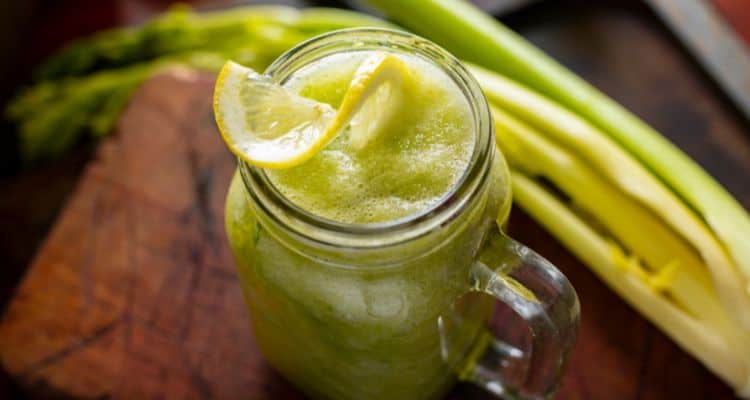If you’re looking for natural ways to lower your blood pressure, you may have heard about the potential benefits of celery juice. Celery has long been known for its low calorie and high fiber content, but recent studies have suggested that it may also have a positive effect on blood pressure levels.
One of the ways celery juice may help lower blood pressure is by acting as a natural diuretic, which can help reduce excess fluid in the body and decrease the workload on the heart. Additionally, celery contains compounds called phthalides, which have been shown to relax the muscles in the walls of blood vessels and increase blood flow. This, in turn, can help reduce blood pressure.
However, it’s important to note that while celery juice may have potential benefits for blood pressure, it should not be relied upon as the sole method of treatment. If you have high blood pressure, it’s important to work with your healthcare provider to develop a comprehensive treatment plan that may include lifestyle changes, medication, or other interventions.
Understanding Blood Pressure
If you’re wondering whether celery juice can help lower your blood pressure, it’s important to first understand what blood pressure is and how it’s measured.
Blood pressure is the force of blood pushing against the walls of your arteries as your heart pumps it around your body. It’s measured in millimeters of mercury (mmHg) and is usually given as two numbers: systolic pressure (the top number) and diastolic pressure (the bottom number).
A normal blood pressure reading is typically around 120/80 mmHg, although this can vary depending on factors such as age, sex, and overall health. High blood pressure, also known as hypertension, is when your blood pressure is consistently higher than this normal range.
High blood pressure can put a strain on your heart and blood vessels, increasing your risk of heart disease, stroke, and other health problems. It’s often called the “silent killer” because it usually has no symptoms, so it’s important to have your blood pressure checked regularly.
There are many lifestyle changes you can make to help lower your blood pressure, such as eating a healthy diet, exercising regularly, and quitting smoking. Some people also turn to natural remedies like celery juice to help lower their blood pressure. In the next section, we’ll take a look at the research behind celery juice and its potential benefits for blood pressure.
Celery Juice: A Nutritional Overview
If you’re looking for a nutrient-packed drink, celery juice is an excellent choice. Celery is low in calories, high in fibre, and packed with vitamins and minerals. Here’s a quick overview of the nutritional benefits of celery juice:
Vitamins and Minerals
Celery is a great source of several essential vitamins and minerals, including vitamin K, vitamin C, folate, and potassium. Vitamin K helps with blood clotting and bone health, while vitamin C is an antioxidant that supports your immune system. Folate is important for cell growth and development, and potassium helps regulate blood pressure.
Low in Calories
Celery is very low in calories, making it an excellent choice for anyone looking to manage their weight. A cup of celery juice contains only about 16 calories, making it a great way to stay hydrated without consuming too many calories.
High in Fibre
Fibre is important for digestive health and can help you feel full for longer. Celery is an excellent source of fibre, with one cup of celery juice containing about 1.5 grams of fibre.
Other Nutrients
Celery also contains several other nutrients, including antioxidants, flavonoids, and phthalides. These compounds have been linked to a range of health benefits, including reducing inflammation, lowering cholesterol levels, and improving heart health.
Overall, celery juice is a great way to add more nutrients to your diet. While it may not be a magic cure for high blood pressure, it can certainly be part of a healthy lifestyle that includes a balanced diet, regular exercise, and stress management.
The Role of Celery Juice in Lowering Blood Pressure
If you’re looking for a natural way to help lower your blood pressure, celery juice may be worth considering. Celery juice is rich in nutrients that are known to promote heart health, including potassium and phthalides.
Potassium and Its Impact
Potassium is an essential mineral that plays a key role in regulating blood pressure. It works by helping to counteract the effects of sodium, which can cause blood pressure to rise. Celery is a good source of potassium, with one cup of chopped celery containing approximately 263 milligrams of potassium.
By increasing your intake of potassium-rich foods like celery, you may be able to help lower your blood pressure naturally. However, it’s important to note that potassium supplements should only be taken under the guidance of a healthcare professional, as too much potassium can be harmful.
Phthalides: Unique Compounds in Celery
Celery also contains unique compounds called phthalides, which are believed to have a positive impact on blood pressure. These compounds work by relaxing the muscles in the walls of your blood vessels, which can help to improve blood flow and reduce blood pressure.
One of the most well-known phthalides found in celery is 3-n-butylphthalide (NBP), which has been shown to have a significant impact on blood pressure in animal studies. In one study published in the journal “Hypertension Research,” researchers found that NBP was able to lower blood pressure in rats with hypertension.
While more research is needed to fully understand the impact of phthalides on human blood pressure, the evidence so far suggests that celery juice may be a beneficial addition to a heart-healthy diet.
Scientific Studies on Celery Juice and Blood Pressure
If you’re looking for a natural way to lower your blood pressure, you may have heard that celery juice can help. But, what does the scientific research say?
One study published in the Journal of Medicinal Food found that consuming celery juice for 6 weeks resulted in a significant reduction in systolic blood pressure (the top number) in adults with mild to moderate hypertension. However, the study had a small sample size and did not include a control group, so more research is needed to confirm these findings.
Another study published in the Journal of Nutrition found that celery extract supplementation led to a significant reduction in blood pressure in rats with hypertension. However, it is important to note that animal studies do not always translate to humans.
Celery contains compounds called phthalides, which have been shown to have a relaxing effect on the muscles in the walls of blood vessels, leading to a widening of the vessels and a decrease in blood pressure. Additionally, celery is a good source of potassium, a mineral that can help lower blood pressure by counteracting the effects of sodium.
While more research is needed to confirm the potential blood pressure-lowering effects of celery juice in humans, incorporating celery into your diet is a healthy choice that may have additional benefits beyond blood pressure management.
Potential Risks and Considerations
When it comes to drinking celery juice to lower blood pressure, there are some potential risks and considerations to keep in mind. Here are a few things you should know:
Allergy Concerns
If you have a celery allergy, drinking celery juice could cause an allergic reaction. Symptoms of a celery allergy can include itching, swelling, hives, and difficulty breathing. If you experience any of these symptoms after drinking celery juice, stop drinking it immediately and seek medical attention.
Interaction with Medications
Celery juice may interact with certain medications, including blood thinners and diuretics. If you are taking any medications, talk to your doctor before drinking celery juice to lower your blood pressure. They can help you determine if celery juice is safe for you to drink and if it could interact with any of your medications.
It’s important to note that while celery juice may have potential health benefits, it is not a substitute for medical treatment. If you have high blood pressure, it’s important to work with your doctor to develop a treatment plan that is right for you. This may include medication, lifestyle changes, and other treatments.
Conclusion
Celery juice has been shown to have potential benefits in managing blood pressure levels. It is rich in vitamins and minerals, including potassium, which can help regulate blood pressure. However, it is important to note that celery juice should not be used as a replacement for prescribed medication.
While there is some evidence to suggest that celery juice may help lower blood pressure, more research is needed to confirm these findings. It is also important to note that the benefits of celery juice may vary depending on the individual and their overall health status.
Incorporating celery juice into a healthy diet and lifestyle may be a beneficial addition for those looking to manage their blood pressure levels. However, it is always best to consult with a healthcare professional before making any significant changes to your diet or medication regimen.
Overall, while celery juice may have some potential benefits in managing blood pressure levels, it is important to approach it with caution and to always prioritize the guidance of a healthcare professional.
Frequently Asked Questions
What are the benefits of drinking celery juice?
Drinking celery juice has been associated with various health benefits, including reducing inflammation, improving digestion, and boosting immunity. Celery juice is also rich in vitamins and minerals, such as vitamin K, vitamin C, and potassium, which are essential for maintaining good health.
Can celery juice help with hypertension?
Yes, celery juice has been shown to have a positive effect on blood pressure levels. It works by acting as a natural diuretic and relaxing the muscles in the walls of blood vessels. However, celery juice should not be used as a replacement for blood pressure medication without consulting a healthcare professional first.
Does celery juice have any negative effects on the kidneys?
While celery juice is generally safe for most people, it may not be suitable for those with kidney problems. Celery is high in oxalates, which can contribute to the formation of kidney stones. If you have a history of kidney stones or kidney problems, it’s best to consult your doctor before adding celery juice to your diet.
How long does it take for celery juice to lower blood pressure?
The time it takes for celery juice to lower blood pressure can vary depending on various factors, such as the severity of hypertension and the individual’s overall health. It’s best to start with a small amount of celery juice (4-8 ounces) and gradually increase the amount over time. It’s also important to maintain a healthy lifestyle, including regular exercise and a balanced diet, to achieve optimal blood pressure levels.
Who should avoid drinking celery juice?
While celery juice is generally safe for most people, it may not be suitable for those with certain medical conditions, such as kidney problems, allergies to celery, or low blood pressure. It’s best to consult your doctor before adding celery juice to your diet, especially if you have any underlying health conditions.
What is the best juice for reducing high blood pressure?
In addition to celery juice, other juices that may help reduce high blood pressure include beet juice, pomegranate juice, and carrot juice. However, it’s important to note that these juices should not be used as a replacement for prescribed medication without consulting a healthcare professional first.

